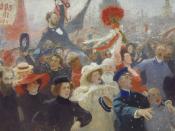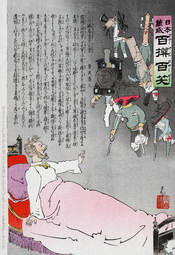Tsarism was under threat from a combination of crises that occurred throughout 1905. The autocracy managed to survive against a weak and disorganized opposition by conceding political agreements and through tough repression with the use of force. Russia suffered from economic tensions and a disastrous war with Japan in the early 20th century. The reluctance of the government to act in problematic situations and its isolation of the problems of Russian society caused general unrest within the peasantry and working class as well as university students. The demonstration of Bloody Sunday ended in chaos after the failure of the army to contain the protest sparked the revolution. The fate of the autocracy was in doubt and under genuine threat. Some of the problems facing the Tsar at this time were the modernizing economy and industry, the backward farming system and the challenges from socialists and liberals. Therefore, the government had to strategically use political concessions to dissuade the population from revolution and retain the loyalty of the army.
The use of force also helped to successfully diminish the revolution. In order to understand why the 1905 revolution failed it is important to analyze the strength of the opposition to the regime, and to realize the timeliness of the political concessions and the effectiveness of the use of coercion.
The opposition to the Russian autocracy was gilded as a strong force to oust the regime, especially after the Bloody Sunday massacre, however there was a lack of unity between the peasants and the industrial workers, and therefore no co-ordination to systematically replace the Tsar with a republic constitution. Bloody Sunday created a common grievance within the peasantry, working class, and middle class, which gave the impression of a powerful revolutionary force. However, fortunately for the Tsarist regime which had most of...



Nicely written
But my only request is a works cited. Other than that, it was a great read.
1 out of 1 people found this comment useful.